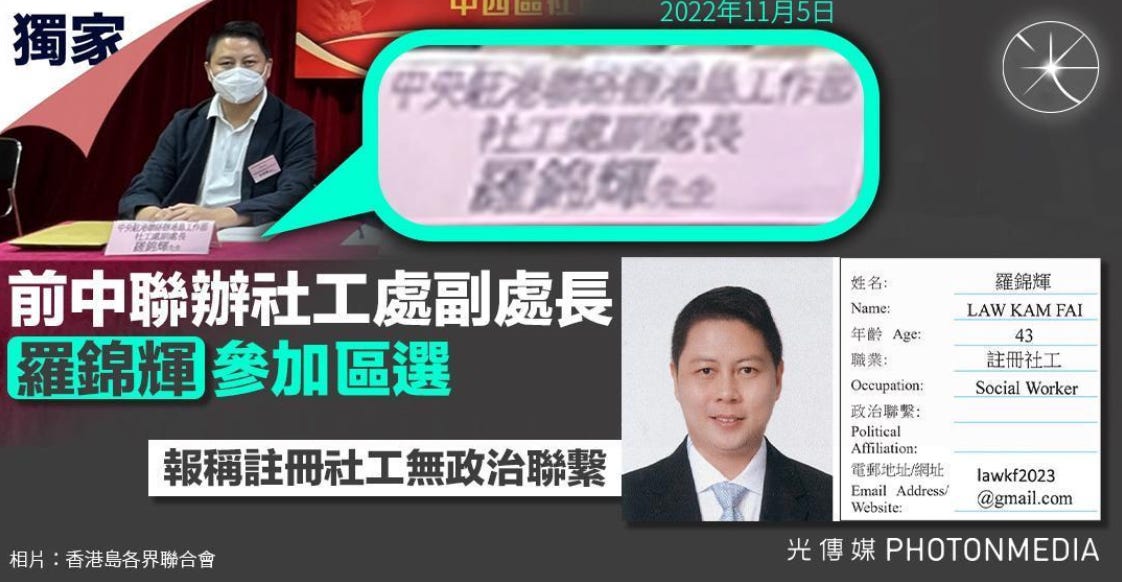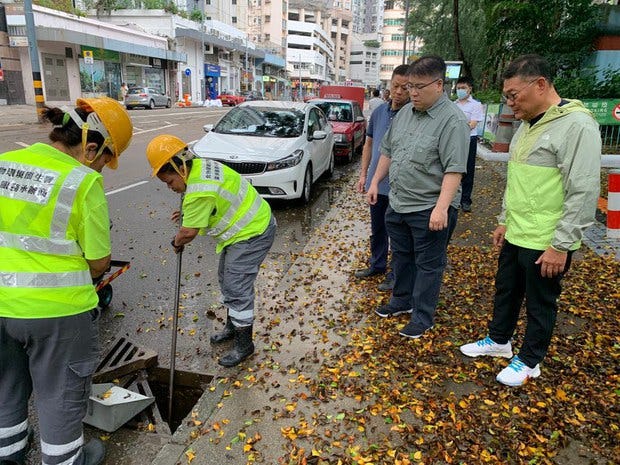The Political Price of Hong Kong’s “Care Teams”
The local District Council candidacy of a former employee of China’s central government office in Hong Kong offers a glimpse of how Beijing is working to insinuate itself into the city's politics.
Only last year, Law Kam Fai (羅錦輝) was identified as an employee of the Hong Kong Liaison Office, the representative office of China's government in the territory. During the District Council elections on December 10, Law will take part as a candidate for Hong Kong Island's Central and Western District, where his former employer — but exactly how former? — is located.
In an exclusive report this week, Photon Media — an outfit of exiled Hong Kong journalists in Taiwan — exposes Law’s deep and possibly ongoing ties to the central government, as well as big local businesses that have donated millions to a fund he chairs. None of these facts — which should disqualify candidates based on Hong Kong law — have been disclosed to the public. The government’s response instead seems to imply that his loyalty is all that matters.
Law’s case also offers a fascinating glimpse into the world of “Care Teams” (關愛隊) in Hong Kong. These are units overseen by the Home Affairs Department that liaise with different organizations in the district to engage in “community-building.” Introduced by Chief Executive John Lee in 2021, they are based on sub-divisions of the city’s 18 districts.
For readers who have been keeping up with our work on Grid-Based Management and the Fengqiao Experience (楓橋經驗), alarm bells ought to be ringing. The “Care Team” system seamlessly dovetails with efforts on the mainland to enforce new and intrusive forms of social management, mobilizing the masses at the grassroots of society to enforce proper conduct — political or otherwise.
Below, we are proud to present a translation of the Photon piece, which can be read in its original Chinese here.
Exclusive|Former Liaison Department Official Joins in the District Elections as a Social Worker with No Political Affiliation
November 28, 2023
A Special Report from Photon Media
Law Kam Fai (羅錦輝), who last year was still serving as Deputy Director of the Social Work Department of the Liaison Office of the Central People's Government in the Hong Kong SAR, is now listed as a candidate for the District Committee of the Central and Western District Council (中西區區議會). Law’s listing as a candidate identifies him as a social worker with no political affiliation.
In the month prior to launching his campaign for election, the 43-year-old Law made a sequence of moves, not only becoming team leader of the District Services and Community Care Team in Sai Ying Pun (the district on Hong Kong Island where the Liaison Office is located), but also serving as co-chairman of an organization called the Hong Kong Central and Western District Community Care and Development Fund (香港中西區關愛服務及社區發展基金). This fund, established only in September this year, was created to support the operation of Community Care Teams in the wider district and has already raised more than 10 million Hong Kong dollars (1.28 million USD), of which 20 percent was donated by local real estate developer Henderson Land. In a response to Photon Media, a government spokesman did not respond directly to questions about Law's background with China’s central government, saying only that the District Council Eligibility Review Committee had deemed all standing candidates as having met the statutory requirements and conditions, and that their nominations were valid.
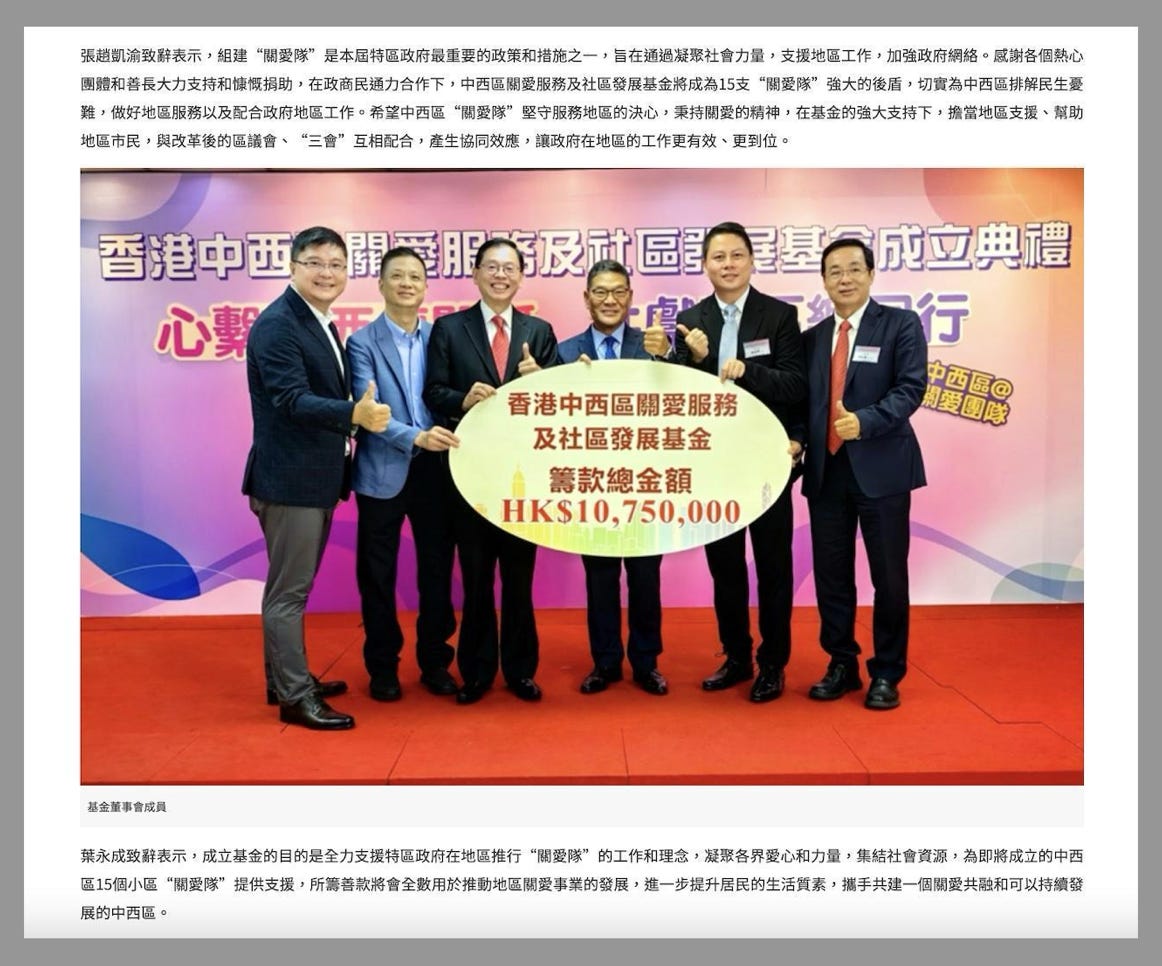
Records show that Law was nominated on October 26 to stand in the Central and Western District Council elections. He reported no political affiliation and submitted the campaign slogan “Fight As One, Build Community Together” (團結奮鬥 共建社區) as part of his candidate profile for the Registration and Electoral Office (REO). Law did not upload his election ads onto the REO’s central platform but instead sent someone to hand them over directly to his constituency’s Returning Officer, the class of officials responsible for overseeing elections in Hong Kong. In recent years, Returning Officers have been granted extraordinary powers to disqualify candidates based on their own personal judgments regarding the “genuineness” of candidates’ loyalty to the government. Unusually for a candidate in local elections, Law does not appear to have a campaign page on Facebook, the most widely used social media platform in the city.

Law, however, is far from a non-entity. He worked for the Central Government’s Liaison Office for many years, and according to the state-affiliated Ta Kung Pao newspaper, he headed the Liaison Office’s Hong Kong Island Sub-Office as early as 2014. The official website of the pro-Beijing Hong Kong Island Federation also shows that Law, in his capacity as deputy head of the Hong Kong Island Social Welfare Department of the Liaison Office, participated in last November’s “Central and Western District Community Sharing Session for Studying to Propagate the Spirit of the 20th National Congress of the Chinese Communist Party.”

In January of this year, the state-run Hong Kong China News Agency, which is directly under the Overseas Chinese Affairs Office of the central government, reported that Law attended a banquet held by the Changle Fraternal Association — a staunchly pro-Beijing group for people claiming lineage to Fujian province’s Changle county — in his official capacity as Deputy Director the Liaison Office’s Hong Kong Island Sub-Office.
Law appeared in media reports again shortly thereafter. In July, the state-run Wen Wei Po reported that Law attended the launch ceremony for a music video celebrating Hong Kong’s handover to China and the successful launch of the Shenzhou 16 spaceflight as chairman of the Central and Western District Committee of the Hong Kong Island Federation, alongside fellow VIP Yang Chengwei (楊成偉), Deputy Director General of the Hong Kong Island Sub-Office of the Liaison Office.
Serving as Foundation Chair, Care Team Leader
About one month before the District Council Election, the Hong Kong Central and Western District Community Care and Development Fund was formally registered, with Law Kam Fai listed as the organization’s chairman. At a ceremony on September 18, the fund announced that it had raised more than 10 million Hong Kong dollars to support the work of local community care teams. Developer Henderson Land was listed as the fund’s honorary sponsor, having donated 2 million dollars. Director of Home Affairs Alice Cheung Chiu Hoi-yue (張趙凱渝) attended the launch, where she said the foundation would provide “powerful backing” for the district’s 15 care teams.
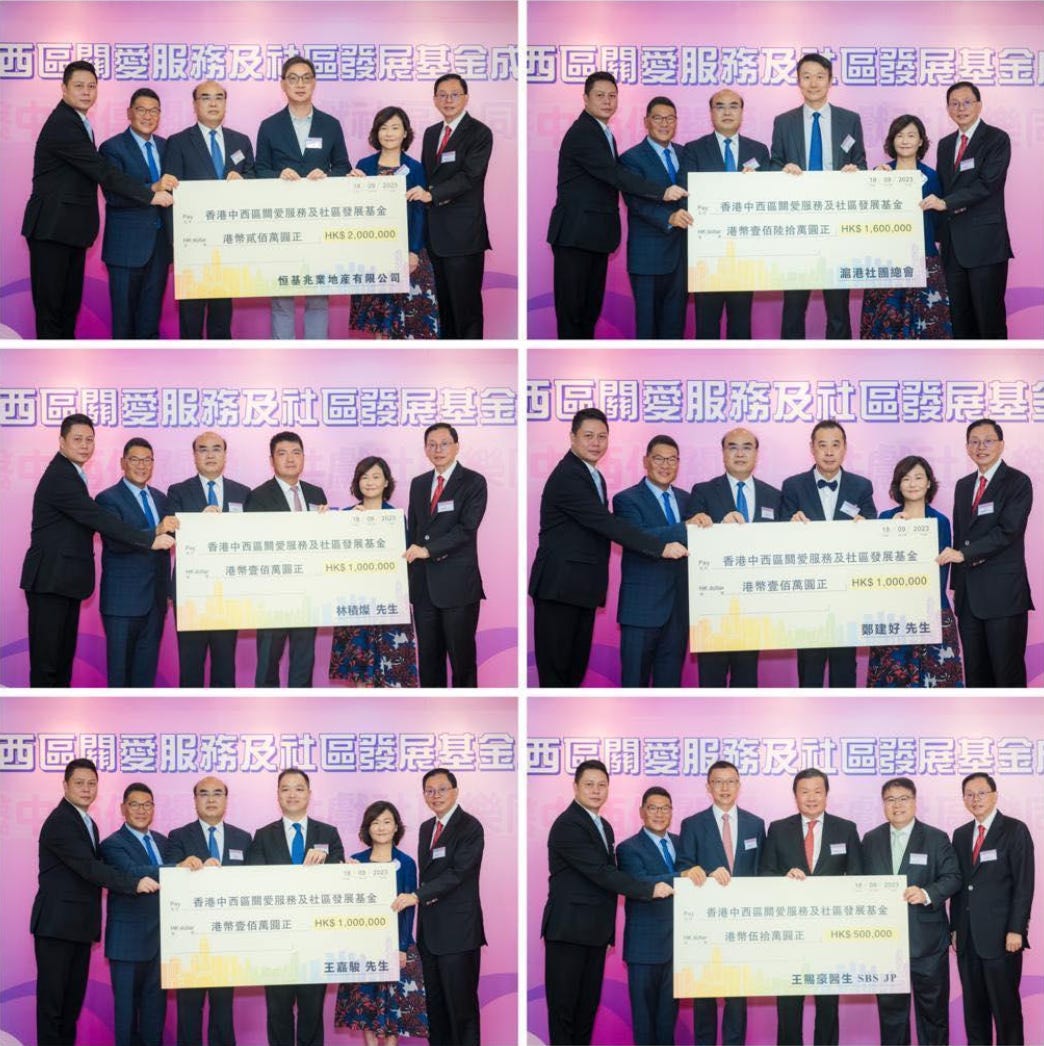
One day after the foundation was launched, the Hong Kong government announced that Law would head the Fong Chung Social Service Centre’s Sai Ying Pun Care Team. The area under the team’s “care” would include the Liaison Office building at 160-161 Connaught Road West. The team’s 26 partner groups included Tong Chun Soy Sauce & Canned Food Company, the state-owned China Resources Holdings Company, Henderson Land, and Citybus, one of the territory’s most visible bus service providers.
One month later, as the nomination stage began for the District Council elections, the Fong Chun Social Service Centre put forward three candidates including Law Kam Fai and Care Team members Wu Wai-hung (胡偉雄) and Lau Tin Ching (劉天正), who is running with the city’s biggest pro-Beijing party, the Democratic Alliance for the Betterment and Progress of Hong Kong (DAB).
According to the candidate information sheet submitted to the REO, Law Kam Fai reports no political affiliation and does not mention his position with the Liaison Office. A person named Law Kam Fai and registered as a social worker can also be found in Hong Kong’s Social Workers Registration Board system, although Photon Media could not confirm that this is the same Law Kam Fai.
According to Article 547 of the District Councils Ordinance, anyone who has worked as a representative for a government outside of Hong Kong (including mainland China) or has claimed a salary from such a government forfeits their right to serve as a council member. This means, in other words, that employees of the Liaison Office cannot become District Councillors. When registering to stand for office, prospective candidates must also declare whether or not they have worked for a government outside of Hong Kong as well as their work history for the preceding three years.
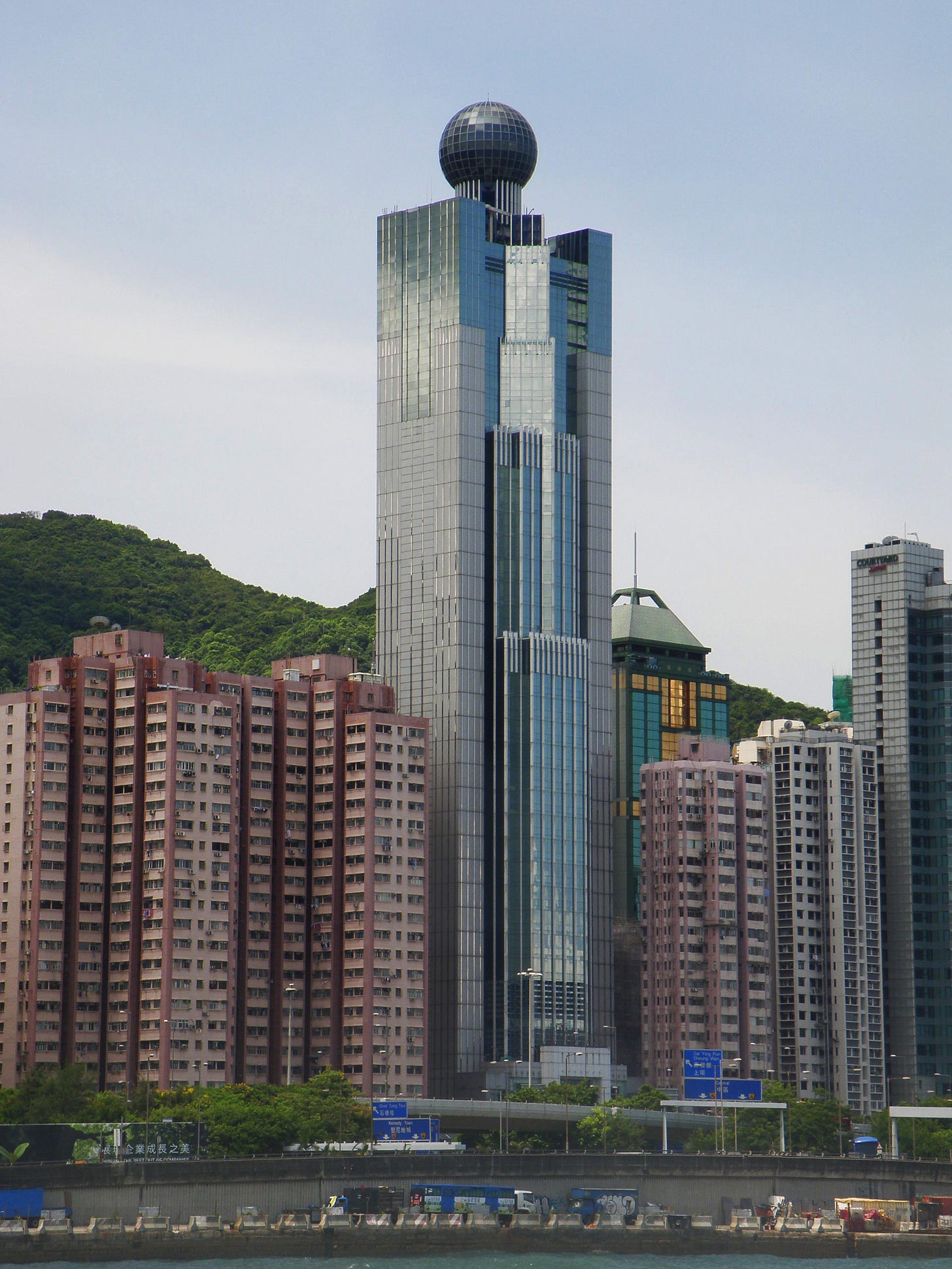
Photon Media inquired with the REO whether Law was still employed with the Liaison Office and whether or not he had reported his work experience including his time with the Office.
In their response, a government spokesperson did not directly address the question of Law’s background. They merely said that all 399 candidates in this year’s District Council election had been reviewed by the District Council Eligibility Review Committee and had fulfilled the statutory requirements and conditions of upholding the Basic Law of the Hong Kong Special Administrative Region of the People's Republic of China, and had pledged allegiance to the Hong Kong SAR. Therefore, the spokesperson said, their nominations were valid.
Former Central and Western District Councillor Sam Yip Kam-lung (葉錦龍) pointed out that after doing community work for years he had never heard Law Kam Fai’s name. He suspects that Law’s experience as the deputy of a Liaison Office Sub-Office means he was directed to seek elected office by his central government employers and definitely has their backing.
A former Liaison Office official ran in 2011 and denied being directed by the Central Government
According to publicly available sources, former officials from the Liaison Office have in the past taken part in District Council elections. Huang Chunping (黃春平), who was previously deputy director of the Publicity and Education Department of the Liaison Office in Kowloon, stood in the District Council elections for the first time in 2011 and obtained 2,934 votes, beating out the Democratic Party’s Kai Ming Wah (計明華), who received 2,118 votes. Huang denied at the time that he had been designated by the central government to take part in the District Council elections and stressed that he had not been in communication with the Liaison Office prior to the race. Huang’s re-election in the 2015 elections was uncontested. In 2019, however, he was defeated by Raymond Tang Wai-man (鄧威文) of the pro-democracy camp.
In 2011, Hao Tiechuan (郝鐵川), then serving as the director-general of the Department of Publicity, Cultural and Sports Affairs at the Liaison Office, responded to questions about Huang Chunping’s candidacy by pointing out that Huang was a Hong Kong permanent resident who had legally taken part in his capacity as an independent individual. “Why should someone like Huang Chunping, who has legally participated in elections, be criticized and discriminated against by certain people just because he formerly worked at the Liaison Office? What is this way of thinking?"
In April this year, Huang Chunping, in his capacity as Director of the Kwun Tong District Committee of the Kowloon Federation of Associations (九龍社團聯會觀塘地區委員會), had tea with Xia Baolong (夏寶龍), the director of the Hong Kong and Macao Affairs Office of the State Council, in a restaurant in Kowloon Bay, during which Huang briefed the official on the establishment of the Kwun Tong District Community Care Team (觀塘區關愛隊).
To support the great work of Photon Media, consider becoming a subscriber.
The Lowdown on the “Care Team” System
ADDITIONAL BACKGROUND VIA LINGUA SINICA
Hong Kong’s chief executive, John Lee Ka-chiu (李家超), first raised the creation of “Care Teams,” or gwaan1 ngoi3 deoi6 ng5 (關愛隊伍) — referred to in shorter form as gwaan1 ngoi3 deoi6 (關愛隊) — in his election manifesto in early 2022. The rollout of the concept was formally announced in Lee’s 2022 Policy Address on October 19, 2022.
According to plans set out in paragraph 93 of the policy address, Hong Kong’s existing 18 administrative districts were to be divided into sub-districts, with Care Teams designated for each. Lee said that his government would “widely engage local organizations and groups” to form the teams, and would “ pull together all sectors including young people and ethnic minorities to take part in community building.”
Revealingly, a letter published in July 2022 in the central government-backed Ta Kung Pao (大公報) newspaper offered a rather comprehensive vision of the Care Team system shortly after the release of John Lee’s election manifesto. Written by Mok Kin-wing (莫健榮), a council member at the Y.Elites Association (香港菁英會), a local membership club, the letter advocated openly for what it called the “gridding of small districts” (小區網格化) in Hong Kong through the setup of a system of Care Teams. Mo recommended the hiring of full-time “contact persons” (聯絡員) at a ratio of 1 per every 10,000 residents, which would “assist the Community Care Team in its regular operation and liaise with different organizations in the district.”
“Caring team services should be managed in a networked manner in small districts so that the services can be precisely and meticulously provided,” Mo wrote.
Mo’s direct reference to what in China is called “grid-based management,” or wanggehua guanli (網格化管理), made explicit the application of this new Care Team system as a mechanism of social and political control — despite a public narrative that focused on service.
As we have covered in-depth at the China Media Project in the course of our research into Xi Jinping era social management approaches reported in the official media, “grid-based management,” or “gridded management,” is an administrative reform that divides the urban communities in China into discrete management units under a concept of unified urban management. The system relies both on the mobilization of human “grid managers” (who monitor and report within the community) and on digital technology platforms that enable widespread surveillance and analysis of information. In the simplest sense, “grid-based management” is the digitizing (数字化) and informationalizing (信息化) of city management at the neighborhood and community levels.
Readers can learn more about the history and development of the concept of grid-based management in our CMP Dictionary.
The rollout of the Care Team system as a localized version of PRC-style grid-based management suggests an escalation of efforts at social and political control — and widespread social surveillance — in Hong Kong.





